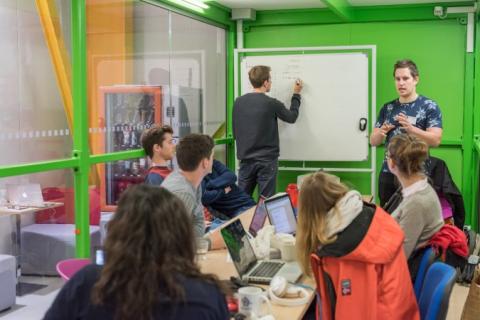It is well-known that CERN is a hub for top-notch scientists, engineers and professionals from all corners of the world, committed to advance their fields, to explore the unknown and to learn. But this combination is also stimulating for the entrepreneurial spirit and therefore makes CERN an ideal place to explore and get started new business ideas, to discover exciting technologies and to build a skilled, diverse start-up team.
Creating platforms where people can meet is an important part of facilitating entrepreneurship at CERN, and through initiatives such as THE Port(link is external), Challenge Based Innovation (CBI)(link is external), the Entrepreneurship Meet-ups and the Knowledge Transfer seminars, future change-makers meet and opportunities are created.
Creativity, commitment & diversity
Creativity, commitment and diversity are cornerstones of both science and entrepreneurship and core values of the Organization. Being at the forefront of multiple fields requires continuous innovation, and much like entrepreneurial companies, CERN tackles the inherent fuzziness of the unknown.
Tapping into the knowledge of the heterogeneous crowd at CERN can create magic. One example is the Better Body Bags. What started as a weekend hack at THE Port hackathon, turned into an R&D contract with the International Committee of the Red Cross and being selected among the TOP25 start-ups in Switzerland in 2014. Also from THE Port 2014, the topic of building a low cost, inflatable fridge for field operations led to a brand-new start-up, Ideabatic(link is external), which was recently awarded a €25 000 prize by ViiV Healthcare(link is external).
Cutting-edge technology, skills & knowledge
The people working at CERN possess unique knowledge and skills, and cutting-edge technologies are continuously developed at the laboratory. These may have applications across markets, and innovations developed might have potential to disrupt whole industries.
Originating from the NTNU Screening Week(link is external) in 2012, the CERN spin-off TIND(link is external) is providing solutions for library management and data preservation based on the open source software Invenio(link is external). 2017 marks their third year in business, and they have now permanently expanded their operations to the United States. Terabee(link is external) is another example, originally providing aerial inspections and imaging services by deploying drones. After a fruitful collaboration with CERN, where sensors were made to ensure the safety of operations in the complex environments of the LHC, its business was expanded to include sensor development.
A jump in the dark
Sometimes, it is not easy leaving a safe environment such as that of CERN. Indeed, while CERN can keep you safely hooked for life, the decision of branching out implies taking on new risks in a whole new environment. Piero Zucchelli, founder and CEO of Andrew Alliance, went through this journey – what he describes as a “jump in the dark” – from the CERN Experimental Physics department to the start-up business. Now, a decade after initially deciding to leave CERN to be an entrepreneur, Piero Zucchelli is returning to share his honest story. “We know exactly what we leave behind, but we don’t know what we don’t know”, Zucchelli says.
Find out more at the next Knowledge Transfer seminar: “From CERN to Entrepreneurship: we don’t know what we don’t know”, by Piero Zucchelli, CEO of Andrew Alliance, here.
Friday 24 March 2017, 10.30 a.m.
Council Chamber
You are invited to join the speaker and organisers for coffee at 10:00
The seminar will be webcast live.

